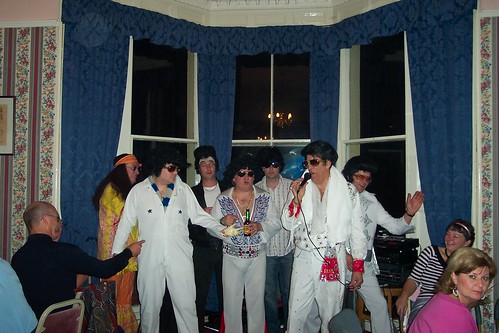Pleased to have one less thing in common with the Wonder Stuff, I do love Elvis. I love the hillbilly cat and the jumpsuited entertainer, and to prevent disillusionment I find it fairly easy to avoid watching the films — it’s not as if they are in heavy rotation on our mainstream channels these days. A love for the King is an isolating love these days. Elvis has become a rubber hat and plastic sunglasses, a jumpsuit and a remix opportunity. Elvis has become, like every dead musical artist worth remembering, a tribute and moneymaking sinkhole.
And I’m as much to blame as anybody, I own an officially licensed Blue Hawaii Hawaiian shirt (see what they did there?), an ‘Elvis pig’ (in mitigation, a gift), and book-after-book both scurrilous and fanboy. But I love the King, it’s where me and Chuck D part company (“Elvis was a hero to most, but he never meant shit to me”) and one of the few touchstones that I’m sure I would have with bum-sex comedian Frank Skinner (who paid silly money for a shirt that may have belonged to EAP).
It’s a love based on the iconography as much as the music, the belts and glasses as much as the sultry vocals, That’s The Way It Is as much as the Carson show and really; ’75 as much as ’56. We’re around the 33rd anniversary of the death of Elvis Aaron Presley, and if there’s anything more undignifying than “dying on the toilet” it’s Elvis Week 2010. A week long excuse to bombard fans with emails for inglorious tat: Jailhouse Rock Flip Flops, the Elvis Hot Sauce Sauce Gift Set (including Elvis Don’t Be Cruel Hot Sauce), the Elvis and Dale Earnhardt Fantasy Race Car Magnetic Guitar Bottle Opener and left over Elvis Week 2009 Golf Balls. But, there’s still the music. In October a new Elvis Complete Masters 30 CD set is being released at the paltry sum of about £573.78 plus shipping, containing all 711 master recordings and a hundred or so rarities — no better way to make sure that it’s the music that matters.

I couldn’t justify a pre-order for that, but I could beg and borrow all studio recordings released to date—and I can listen to all six hundred and ninety-eight of them in order. I could do the listening bit as I was ill with a stodgy cold and home alone as my other half was away to visit friends for the weekend—had she have been in situ there would have been no chance of getting through it in a sitting. A ferociously opinionated music fan, Jules has banned many of my favourites from play in her presence, mainly what she calls “wimpy indie music” (The Smiths, Belle and Sebastian, Black Box Recorder amongst them) but my recent obsession with listening only to covers of the Stones’ Satisfaction didn’t go down well either.
So I did, I loaded them all into iTunes, ordered by recording date as best as I could, from 1953’s My Happiness to 1976’s recording of Way Down (a posthumous Number One in the UK in 1977). That’s 1.2 days according to Apple. I started at 1pm on a Saturday, with intentions of attempting it in one go.
I wasn’t actually sure what I was attempting: it had something to do with sorting out my reactions to Elvis, something to do with wanting to make my own mind up on all those film soundtracks and deciding if the early years and the Vegas years were the same guy in anything more than physical body. Also, it was there, er, they were there, a mountain of Memphis to drag myself up with the use of ropes and crampons.
The foothills are easy, and seem so far in the past: the first couple of recordings were self-financed, are scratched beyond repair, and seem odd song choices if they really were presents for the venerated mother Presley. They, and almost all Elvis songs are based on love—romantic love to start with, then there’s the love of God, you sometimes have to look past the hard headed metaphors (cows, lots of cows early on. And moons). It’s not until Old Shep, 53 songs in for me and the King that there’s anything other than the birth of rock and roll. We’ve passed the echoing inventions of Sam Phillips, heard the bass slapped and the snare ratted, we’ve heard Elvis’s voice buckle country music out of recognition and into something dangerous and now it’s time for the dog. I’m a huge fan of epic, maudlin, Elvis whether it’s lost love (ooh loads), society’s ills (In The Ghetto), eternal damnation (all of the gospel recordings by implication) or a dead pooch.
In the fifties we get the templates for almost all of Elvis’s later output, and much of everybody else’s too — there are times, especially in the first big rush of success (Tell Me Why, 61 songs in) in 1957 where the material available to band isn’t anywhere near good enough. The vocals hold it together, and it’s a relief when the gospel recordings start they have a depth and sound less old—by virtue of sounding ancient to start with— than (Let Me Be Your) Teddy Bear (1957, 76 songs in) et al.
Could anyone of a similar pop standing (not that there is anyone) pull this off today? Could a major star change tack and record such openly religious music? Even 80s Dylan struggled with a Christian phase, maybe a chart-y soul singer could have a go but it’s unlikey that anyone would have the guts. It Is No Secret (What God Can Do) (68 in) has a wonderful oo-ee-oo at exactly 1:39.
It’s a while ’til we hit real movie detritus, but recordings from Jailhouse Rock offer a deathly foreshadowing of that which is to come—poor lyrics and simple melodies. It’ll get worse, but we’re okay for a while. What was Elvis in jail for in Jailhouse Rock, are these the stylings of an innocent man—did he just want to “stick around” to “get [his] kicks”? Forget this for a while, I tried to. Like I tried to forget that I’d made a terrible error at the Asda before starting the marathon and bought sugar-filled Pepsi rather than the similar looking caffeine-and-sweetnered Pepsi Max, a mistake that may well have lead to my dozing off later during a particularly one-note run of soundtrack sounds.
Crawfish from Kid Creole (122 songs in) was, I thought for a while, a new piece of non-metaphoric Presley. Was it the forerunner of the first few Beatles songs to leave that basic love/sex pop fascination—a song as dirty as this about a fish would have been way ahead of its time. Further reading or actual listening to the words revealed the crawfish to be ‘little Elvis’, and I was disappointed. By this stage I was keeping a tally of odd metaphors, three about cows, four moons (three of them blue) but this the first fish. I lost count eventually while looking for Elvis Firsts—and as I was so excited to find the classic ‘Elvis Talky Bit’ so early. Are You Lonesome Tonight (1960, 155) is the one with the “someone said the World’s a stage” line and is the most famous and best time that the King drops out of character, turns directly to you and solves your problems.
It finishes on the line “and then came act two” and that’s a good a point as any to really hit the long dark movie years of the soul.
Everyone knows that Elvis movies start okay, with proof that when given the right roles (young punk singers in the big city, not too much of a stretch) there is acting talent, and songs that mostly wouldn’t sound out of place on ‘proper’ albums. Everyone knows that the movie business was eventually what killed the King, that Colonel Tom loved the film deals and the art could go hang. Everyone can point to Elvis’s Greatest Shit the in-no-way official compilation of the biggest musical atrocities and say that it’s almost exclusively from the movie years. Song of the Shrimp (Girls! Girls! Girls! 1962, 279) Old MacDonald (Double Trouble 1966, 411), and Dominic (Stay Away Joe 1967, 485)— a song about a shag-shy bullock—prove that.
But everyone is wrong. A bit.
Without exception, unless I was hallucinating on Onion Ring-style corn snacks, every film contains at least one great recording—the single from the album if you will. I started to save details of these lesser spotted flashes of ’56: Black Star (from Flaming Star 1960, 164) is county cowboy Roy Rogers done right, Charro! (Charro! 1968, 489) is the title track from his only non-singing role film and has a Joe Meek-eque production that really works.
In the days of limited media access, it’s frightening to think that the films were the only way you’d glimpse your favourite artist, and the awful soundtrack albums with terrible artwork. There no wonder that a whole pop and rock tradition built up while he was away. I took many an opportunity to pop to the toilet around this time.
The bad-film era does give us the first real batch of those gospel classics—enough to keep me going until the promised land of 1968. The ’68 special is, by some, held up as Elvis Presley’s last great work, but I find it a rehash of stuff that had gone before. Necessary to cleanse the palette perhaps, but nothing new recorded around this time has any great worth, we really do need to wait for the full big band sound to get into place before he becomes great again. I’ve been listening for over 24 hours now (I did drop off, but restarted at last remembered song) and I’m aching for the big sound of the Vegas years.
He can sing anything by this point, it’s all in place—band, producers, strings, horns, the Jordanaires. The only way it can go wrong is the song. When the song is right—I Washed My Hands In Muddy Water (1970, 570)— it’s perfect. When it’s wrong l’ll Take You Home Again Kathleen (1971, 615) it just doesn’t work.
Elvis is making me cry with regularity now, no-one hits a note of drunk self-pity better and even when you’re not inebriated you can remember those pissed moments when the only man that can understand how wronged you are is Elvis Aaron Presley. Well, him and Him. For we get that gospel thread back at this stage.
I spent most of my time at this point musing not on lyrical content, for Elvis is long past hiding behind anything the truth (whoever is writing) is laid bare, but on how Elvis is very much a religious figure. If my experience is coloured by the traditional Irish household I first heard Elvis records in, then perhaps that’s it. I see the EAP, JFK, and the Pope as the parts of a Catholic trinity almost as holy to people in the late seventies as the ‘real’ one. It’s something to to with the redemptive power of song, the way in which Elvis confesses every sin—all borne through love—powerfully and honestly. Though they are others’ words, it’s Elvis’s truth. The greatest interpreter of song and emotion ever.
It takes Elvis 690 songs before he has a knock at Danny Boy (1976, 690) and it breaks the spell a little. Drawn in to the religiosity and expanse, I’m not buying that sentimental guff and it’s obvious that his heart isn’t in it.
Way Down (1976, 698) picks me up—despite containing the lowest note sung by a human on a recorded release by J.D.Summer— it’s a fitting end. I still love Elvis.
I tweeted throughout the experience at @elvismarathon, an archive of the Tweets is here.
A Spotify playlist of my ‘discoveries’ is here.

